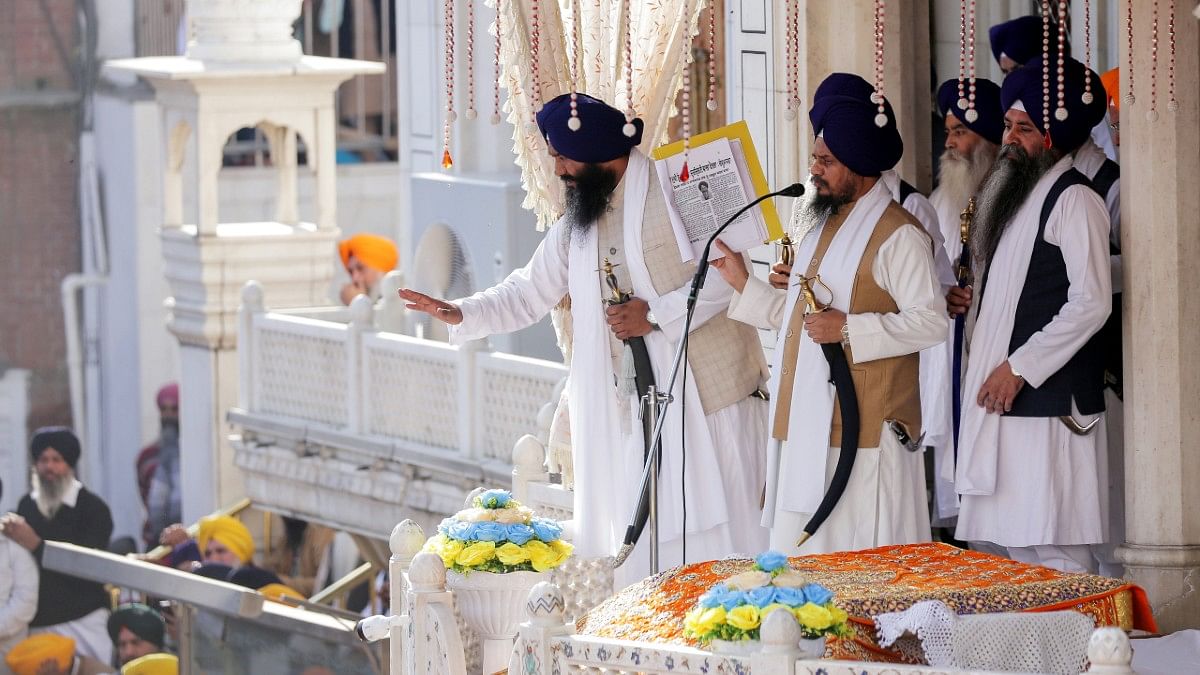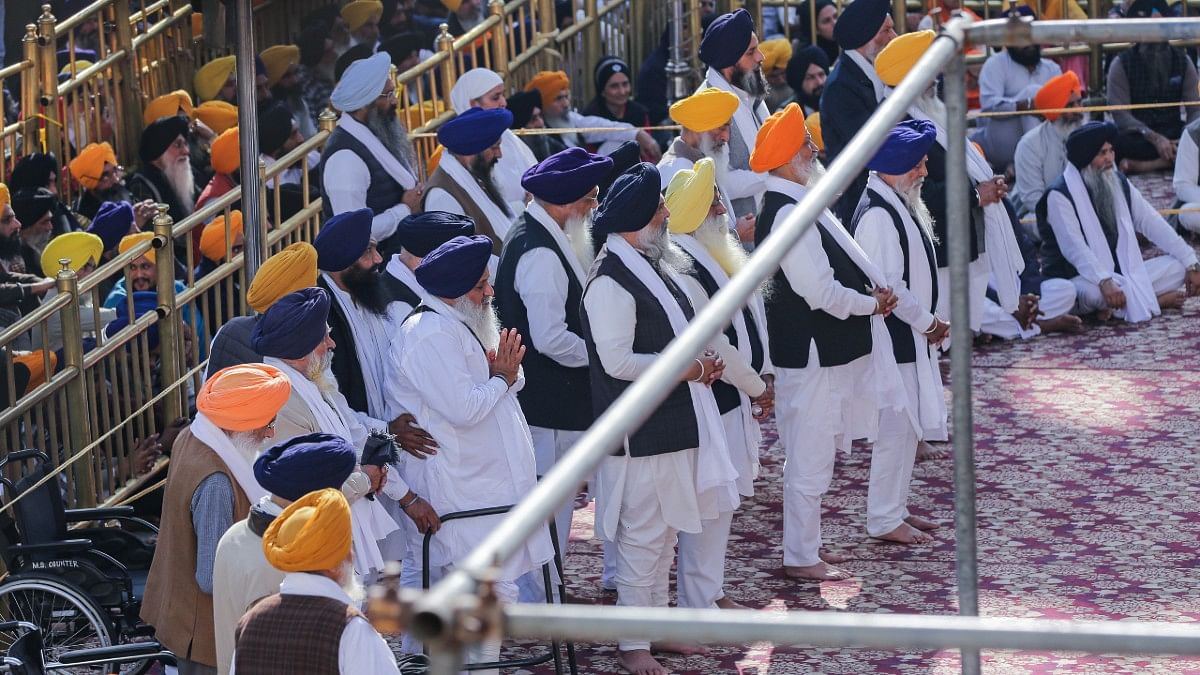Chandigarh: The Akal Takht, highest temporal body of Sikhs, has “ordered” the removal of former Punjab deputy CM Sukhbir Singh Badal as president of Shiromani Akali Dal (SAD) as “punishment” for “sins” against the Sikh community for which he had been held guilty.
Akal Takht has also revoked the title ‘Panth Rattan Fakhr-e-Qaum’ (pride of community) bestowed on Sukhbir’s father Parkash Singh Badal in 2011. Senior Badal was punished posthumously for being party to ‘anti-Sikh’ decisions made during his tenure as CM.
As atonement for his ‘sins’, Akal Takht ordered Sukhbir to “clean the toilets” in the Golden Temple complex in Amritsar on 3 and 4 December. Taking note of the fact that Sukhbir suffered a fracture last month and is wheelchair bound, the Akal Takht later modified the punishment. He will now have to fulfill the role of a guard at the Golden Temple main gate for one hour Tuesday and Wednesday, wearing the appropriate robe and holding a spear.
During this time, Sukhbir Badal will carry a wooden board around his neck declaring him a ‘sinner’. He will then have to repeat this at four other gurdwaras in Punjab, including Keshgarh Sahib and Fatehgarh Sahib.
The punishment was declared from the ramparts of the Akal Takht Sahib at Golden Temple by Jathedar Giani Raghbir Singh, following a joint meeting of the jathedars of the five takhts (seats of authority of the Sikhs). Sukhbir, along with almost the entire senior leadership of the SAD, was present there to receive the punishment. The 62-year-old was declared a ‘tankhaiya’ (a sinner, guilty of religious misconduct) on 30 August.

On Monday, Akal Takht also virtually handed over the reins of the Akali Dal to a six-member committee led by Shiromani Gurdwara Parbandhak Committee (SGPC) president Harjinder Singh Dhami. The committee has been tasked with starting a fresh membership drive and overseeing the election of a new party president and executive committee.
Sukhbir Badal offered his resignation as SAD president to the party’s working committee a day before he was declared ‘tankhaiya’. Balwinder Singh Bhunder was made acting president, but the working committee has yet to accept Badal’s resignation—for which Akal Takht pulled it up Monday, asking it to expedite the process.
The Akal Takht held Sukhbir guilty for taking decisions that led to “severe depletion of the image of the Sikh community, deterioration of the condition of the Shiromani Akali Dal and damaging Sikh interests”. A rebel group of the SAD had submitted a complaint to the Akal Takht jathedar on 1 July alleging Sukhbir made several erroneous decisions in his capacity as deputy CM (2007-17) and SAD chief (since 2008). The rebel group held him responsible for failing to nab those responsible for instances of sacrilege of the Guru Granth Sahib in 2015 and orchestrating the grant of pardon to Dera Sacha Sauda chief Gurmeet Ram Rahim Singh that same year through the Akal Takht—later retracted in face of backlash.
Sukhbir presented himself before the Akal Takht on 15 July, admitted to the allegations and apologised for his decisions. The Akal Takht also asked members of Parkash Singh Badal’s cabinet, who it said were party to the acts of religious misconduct, to explain their position.
Before declaring the punishment, the Akal Takht jathedar questioned Sukhbir on six counts: was he responsible for ‘diminishing the glory’ of the Sikh religion; did he promote police officers responsible for massacre of innocent Sikhs during the militancy years; did he facilitate pardon for Dera chief by calling the then jathedars to his residence in Chandigarh; whether he failed to nab the guilty in cases of sacrilege cases; and whether he misused donations made to the Golden Temple to issue advertisements on behalf of the Akali Dal justifying the decision to pardon the Dera chief.
To all these questions Sukhbir Badal replied in the affirmative, adding that he and his party made several mistakes while in power.
Also Read: From Maharaja Ranjit Singh to Sukhbir Badal, who are ‘tankhaiyas’ & how they atone for sins
Punishments for Dhindsa, Majithia
Jathedar Raghbir Singh went on to question other SAD leaders over their suspected role in these decisions, while Takht Sri Damdama Sahib jathedar Giani Harpreet Singh questioned party veteran Prem Singh Chandumajra.
Chandumajra denied supporting the decision to pardon the Dera chief, in response to which Giani Harpreet Singh read out a news report contradicting Chandumajra’s version.
Apart from Badal, six other senior Akali Dal leaders (Sukhdev Singh Dhindsa, Daljit Singh Cheema, Gulzar Singh Ranike, Balwinder Singh Bhunder, Hira Singh Gabria and Sucha Singh Langah) were held guilty by the Akal Takht of being party to the Badals’ decisions.
All six, with the exception of Dhindsa, were ordered to clean the toilets in the Golden Temple complex for an hour Tuesday and Wednesday. They will then have to perform seva (service) in the langar hall, wash utensils, listen to kirtan for an hour and complete one reading of the Sukhmani Sahib (Sikh scripture).
Exempted from cleaning toilets owing to his age, Dhindsa will join Sukhbir Badal at the main gate of the Golden Temple, and later at the other gurdwaras.
Further, the Akal Takht has directed all seven including Sukhbir to return donations ‘misused’ by them, in the form of advertisements justifying the pardon granted to the Dera chief, to the SGPC—with interest.
Another 10 senior Akali Dal leaders including former SGPC president Bibi Jagir Kaur and former state minister Bikram Singh Majithia have also been told to clean toilets Tuesday, in addition to cleaning gurdwaras in their neighbourhood for either publicly supporting Badals’ decisions or choosing to remain quiet at the time.
The Akal Takht also directed Akali Dal workers to plant 1.25 lakh saplings between 1 March and 30 April next year, while asking the rebel group within the party to resolve differences with the leadership.
‘Akalis promoted Dera culture in Punjab’
Before announcing the punishment Monday, Takht Sri Damdama Sahib jathedar Giani Harpreet Singh lashed out at SAD for its ‘failure’ to stand up for the Sikh community. He held the party responsible for pushing Punjab into militancy, and pointed out that the party was in power when 13 Sikhs were killed in clashes on Baisakhi Day in April 1978.
“The Akali Dal failed the community and as a result the community had to resort to protecting itself using weapons. That led to much bloodshed. The police barbarically killed hundreds of innocents including women and children,” he said.
The Akalis, when they came to power in 1985 in the aftermath of Operation Blue Star, were expected to heal open wounds. “But the Akalis rubbed salt into the wounds. Instead of giving justice to those who fought against the cruel system that had killed hundreds of Sikh youth, the Akalis started promoting Dera culture in Punjab,” said Giani Harpreet Singh.
Giani Raghbir Singh said it was a matter of shame that despite being a panthic party, Akali Dal failed the Sikhs, to enjoy political power. “The Akali Dal has deviated from its original duty. For the past 5-10 years, even the act of the jathedars have become suspect,” he said.
Akal Takht also condemned Harwinder Singh Sarna, former head of Delhi Sikh Gurdwara Management Committee, and SAD’s Virsa Singh Valtoha for “demeaning the position of the Akal Takht by their public utterances”. It declared Sarna a ‘tankhaiya’ and warned Valtoha.
A ‘tankhaiya’ is loosely defined as any Sikh found guilty of violating the rehat maryada (Sikh code of conduct), or an act deemed detrimental to the Sikh religion. It is a centuries-old tradition. The Akal Takht jathedar, accompanied by the four Singh Sahibaan (jathedars of four holy takhts of Sikhism, in addition to the Akal Takht which is the supreme seat of power) alone can declare a person a ‘tankhaiya’ after following due procedure.
A Sikh declared a ‘tankhaiya’ is seen as a “sinner” of the Sikh community and has to undergo atonement (tankha) as decided by Akal Takht. Once punishment is complete, the ‘tankhaiya’ is forgiven. Failure to comply with the punishment can result in excommunication from the Sikh community.
(Edited by Amrtansh Arora)
Also Read: Uniting factions to excommunicating top leaders, how Akal Takht has played arbiter in Punjab politics

